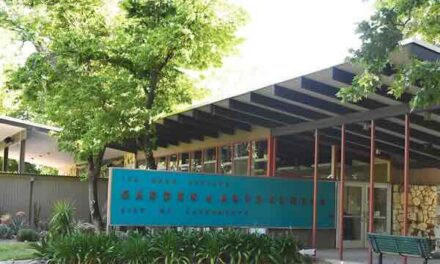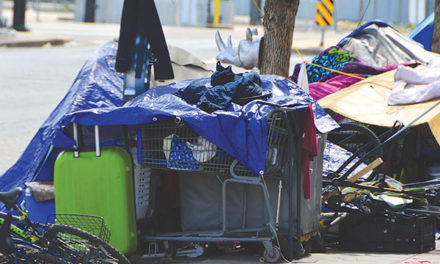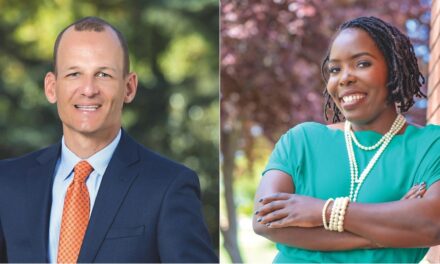Downtown Renaissance
Mayoral candidates discuss central core’s future
January 2024
Inside Sacramento plans to sponsor a mayoral debate in February at a date to be determined. Requests to schedule the debate at Sacramento State or the SMUD campus were denied without explanation. See our February editions for details.
Second of Three Parts
Inside Sacramento interviewed the four candidates for mayor in the March 5 primary election—Flojaune Cofer, Steve Hansen, Kevin McCarty and Dr. Richard Pan. The top two finishers will advance to a runoff in November if no candidate receives at least 50.1% of the March vote. The election is nonpartisan.
Cofer is policy director for Public Health Advocates, a nonprofit that promotes community health care. This is her first run for public office.
Hansen is a managing partner for Lighthouse Public Affairs, a corporate consulting firm. He served as a City Council member for eight years.
McCarty is a five-term state assemblymember and former City Council member, where he served 10 years.
Pan, a pediatrician, is a former state senator and assemblymember, serving two terms in each house. This is his first campaign for city office.
Interviews were edited for clarity and length.

Do you support a daytime camping ban as suggested by City Council members Rick Jennings and Eric Guerra?
Cofer: No. I do not support any camping bans. They are costly and will only help disappear people, not solve any problems or move us closer to real solutions.
Hansen: Yes. We must be compassionate, but we must also be firm in keeping our streets safe. This is the number one issue in the city, and this proposal was borne out of the sheer frustration by residents and neighborhoods who feel that there has been no progress on the worst impacts of tent encampments—drug dealing, assaults, stealing and mess. We must make sure our laws are effectively enforced, but we must also ensure that services are offered in these camps to help people get off the streets and improve their lives.
McCarty: Yes. We can’t allow urban camping in Sacramento—whether it’s during the daytime hours or nighttime hours. I supported Measure O and its promise to unequivocally prohibit street camping and aggressively open more appropriate safe ground and emergency shelter locations.
Pan: It is my understanding that no specific language has been drafted or details of the ordinance discussed. We will not comment on the ordinance until language is drafted. With that being said, I support enforcement of existing city ordinances, and making sure that the public has access to community spaces including sidewalks, parks, schools, and other public infrastructure.
Should the city police budget be cut and sworn positions reduced?
Cofer: There are lots of calls that don’t require a police officer. Let’s look at what keeps our community safe. We went two years with no youth homicides. And we did that because of funding for violence prevention. We need to do more than just policing to keep us safe, so I want to look at public safety. That may involve some reductions so we can invest in other places. Funding public safety is different than just funding emergency response.
Hansen: No. I believe we need to reduce response times and we need to increase neighborhood safety. We need to look at rebuilding the sworn officer ranks. We’re staffed below the Great Recession right now. And that is unfortunate. We can’t enforce traffic. We lack staff. We have mandatory overtime. Understaffing leads to mistakes.
McCarty: No. We don’t have the luxury of cutting the police budget. We can always be smarter and how we focus on public safety and law enforcement, but I don’t support reducing the police budget.
Pan: No. We don’t have enough officers to do the job. We have too many vacancies. We have one of the lowest ratios of police officers to population of any city in California. We need enough officers to do the job.
Should the city prohibit gas line service to homes and businesses?
Cofer: Yes and no. We have a lot of people who are currently relying on gas. I don’t want the city to make it impossible for people to continue to live with gas appliances and service. But I do think we should be moving towards electrification.
Hansen: There are two parts to that. One is the state is moving towards prioritizing electric buildings and creating a lot of incentives to develop those communities. If you’re an existing business or an existing structure, we don’t need to force anything right now. Our region needs the reliance of a strong utility district. But if you’re an existing business or home, we don’t want to force a transition that you can’t afford or is unfair. We need to give people time.
McCarty: Yes. I support the greening of our economy. For economical and for environmental reasons, electrification is better for our environment, air quality and climate change. Focusing on incentives to make those changes and doing it for new home construction is the better route to go.
Pan: This certainly is not my top priority. Obviously, climate change is something we need to deal with. But my top priority is trying to address public safety and homelessness. I don’t think the city should be putting money into extending gas lines. But if there’s an existing gas line, and someone wants to hook it up to open a restaurant, I’m fine with that.
Are general fund priorities—public safety, youth, parks—the right priorities?
Cofer: Since when do we have general fund priorities? We have not set priorities as a city in many years. You say the priorities are public safety, youth and parks. I would say homelessness needs to be in there. It’s a little different than public safety. Housing insecurity and affordability, those aren’t the same things as public safety. Housing insecurity is one of our top issues. Climate change is one of our priorities. And community safety is one of our priorities.
Hansen: Absolutely, yes. Cities were founded for the common safety, health and welfare of their people. That’s our job: police, fire, parks, making sure that streets are safe. That’s what the general fund is for.
McCarty: I’m very familiar with the city budget, having been a councilmember for 10 years. Roughly 80% of the discretionary general fund budget goes to police and fire, after you pay taxes and debt service and so forth. Parks come next. The mantra for the city is keep our communities clean and safe. I like that the city now has a dedicated funding stream from cannabis to fund more youth programs. Public safety is the overwhelmingly largest piece of that and that’s what the community wants.
Pan: Our top priorities should be public safety and the homeless issue. They’re related but not identical. Our top priority needs to be public safety and addressing homelessness.
Will you generally support and continue the policies of Mayor Steinberg?
Cofer: It depends on what policies. Some things have been done well, but I’m running because there are some things that we could do differently. I would like to see us have 24-hour response to homelessness and mental health crises. I would like to see us have a tenant anti-harassment ordinance. Those haven’t been supported by the City Council. I want us to identify where people can be so we’re not criminalizing people for being poor and unhoused. I’m not in favor of compelling people into services. We haven’t even offered them services for them to reject. Now we’re going to force people into services? That feels very un-American. I’m deeply in support of the Department of Community Response and feel it hasn’t gotten the support it needs from the community. I’m a collaborative person and want to hear from people I don’t agree with.
Hansen: That’s an amorphous question. There might be some things that I don’t continue and there might be some things that I continue, but we have to all work together to figure out how to keep the city as a vibrant place to live that’s clean and safe but also fiscally responsible. We have significant headwinds. We’re continuing to create new jobs and businesses for revenue and not just raise taxes. The mayor has a very strong role but has to work with the council because you need five votes to get anything done. I’m not going to go from one idea to another every day or week or month. We’re going to lay out a plan where I work with the community to make sure they get buy-in. We’re not going to try to do 1,000 things. We’re going to do a very narrow set of things really well.
McCarty: I respect Mayor Steinberg and the work that he’s done for the city. We have a lot of common priorities, but I want to move the city forward and address things we haven’t been able to tackle, such as homelessness and housing.
Pan: No. I’m going to bring more focus to the City Council. Just recently the council had a prioritization session. The city manager begged them, can you please prioritize your priorities? Our top priority should be addressing public safety and homelessness. I’m not saying we don’t do anything else, but when I’m elected there will be no question what the mayor’s priorities are.
Will you support a mayoral commission with the goal of Downtown renaissance?
Cofer: Yes, I love the idea of a Downtown renaissance. I would love to start there and then move to other areas that could benefit from attention and planning. One of my priorities is getting more people involved in making decisions, and taking advantage of our boards, committees and commissions. I’m in favor of an LGBTQ commission. I would love to have some of the regions in our city have commissions so they could come up with some proposals that make an impact.
Hansen: Yes. It’s incredibly important to make sure the city is focused on our major revenue generating area: Downtown. The central city isn’t just a playground for people to come and go from. It’s the greatest producer of revenue for our city. If we allow it to fall apart, if we don’t have a plan for the next economy, then the city will likely go bankrupt. Some kind of Marshall Plan for the central city is essential. Investors across the country will make a decision on this region based on the central city’s look, feel and quality of life. It determines our city’s financial health, our psychological health and our morale.
McCarty: Yes. City governments can’t do everything. We can’t control interest rates, can’t control labor costs, don’t control the cost of food and materials, steel and wood. But we can control whether to incentivize outside dining, the music scene, tourism. We can celebrate our Downtown and look for ways to evolve. I absolutely support the idea.
Pan: Yes. We have many neighborhoods, but Downtown is the core. The homeless and public safety issues prevent us from making progress and revitalizing Downtown or other neighborhoods. With 40,000 state employees being permanently furloughed, that created a vacuum. How do you get them back? They need to feel safe coming back. I would strongly encourage them to come back, including city employees.
What are your plans for Downtown revitalization?
Cofer: I haven’t focused on Downtown specifically. What I’m looking at is the entire city. What we need to do is think about the things that are good in Sacramento that we can build on. We’re not a diet version of the Bay Area or a knock off version of Southern California. I don’t want us to become Silicon Valley light. I want us to take advantage of what’s unique here. We have this new convention center. Instead of trying to get big conventions that we don’t have hotel space to support, what if we did more in the arts? Like an international DJ festival, make it our own thing, for people here, instead of trying to compete with somebody else who already has it.
Hansen: As the former councilmember for Downtown, we need to position the city center for a broad-based revival in partnership with small businesses, property owners and community stakeholders. We need to ensure Downtown is clean, safe, and that we build new housing and hotel rooms to support our businesses and the visitor economy. This will be an all-hands-on-deck effort to reposition Downtown to capitalize on the success of the Golden 1 Center and diversify the post-pandemic economy away from reliance on office workers.
McCarty: Our Downtown core has changed dramatically post pandemic, especially with our state workforce. We need to think outside of the box to activate our urban core. One strategy is adaptive reuse. My law to turn underutilized state buildings into housing is already paying dividends. To help our Downtown retail and restaurants thrive, we need to do more of this, as well as deliver safety enhancements.
Pan: We need to restore order to public spaces. Our sidewalks need to be accessible. Our parks. Businesses need to know it’s safe for their workers and customers. We’re not going to have people come Downtown if they don’t think it’s safe. We have to acknowledge they’re not all going to come back, so we need to look at where we redirect future development. We need more housing overall, because when people move in, they support local businesses. We’ve been reliant on state workers, but the largest private employer is health care. I’m a doctor. I probably know more about the health care industry than anyone else running. I’ll be out there trying to get more jobs into the city, including Downtown. We have to look at getting the state to pay its fair share, because the state doesn’t pay property taxes on any of its buildings, and businesses end up having to subsidize city services.
Please submit reader comments to Cecily Hastings at publisher@insidepublications.com.














